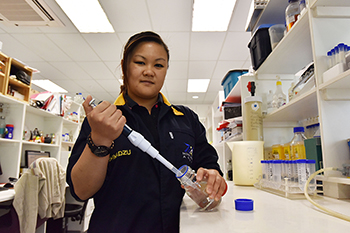Latest News Archive
Please select Category, Year, and then Month to display items
25 February 2022
|
Story Lacea Loader
![]()
The Qwaqwa Campus of the University of the Free State (UFS) will reopen on 28 February 2022. The decision was made by the university management today after the campus was closed on 22 February 2022 due to violent protest action.
From 28 February 2022 to 4 March 2022, all classes will be presented online.
Students will be informed by their respective faculties about the model of academic delivery that will be followed from 7 March 2022.
The arrangement is estimated to continue for two to three weeks at the most, after which the academic programme will return to the approved teaching plans for 2022.
Issued by:
Lacea Loader
Director: Communication and Marketing
University of the Free State
23 February 2022
The impact of personal care products on water resources in the Free State
2015-12-14

Jou-an Chen
Photo: Charl Devenish
|
Water is of the utmost importance in personal hygiene. Most people can hardly have a day go by without taking a shower in the morning and at night. However, it is this very habit that is increasingly polluting the water resources in South Africa.
Contaminants found in pharmaceutical and personal care products have been accumulating in water masses in recent years. These contaminants especially refer to hormones in medication, as well as colouring agents and fragrances used in soap, shampoo and body lotions.
“Little information and data are available on the prevalence of these contaminants, and on how high the level of pollution really is,” says Jou-an Chen, researcher in the Department of Microbial, Biochemical and Food Biotechnology at the UFS.
Her research particularly focuses on the prevalence and impact of those contaminants.
“Because these substances have not been properly investigated, we are not sure how widely it occurs and whether it is harmful to the environment. It was precisely the lack of information that has inspired me to investigate further.”
“If we could identify the contaminants and what it is doing to the environment, it could make a valuable contribution to directives on water quality standards.”